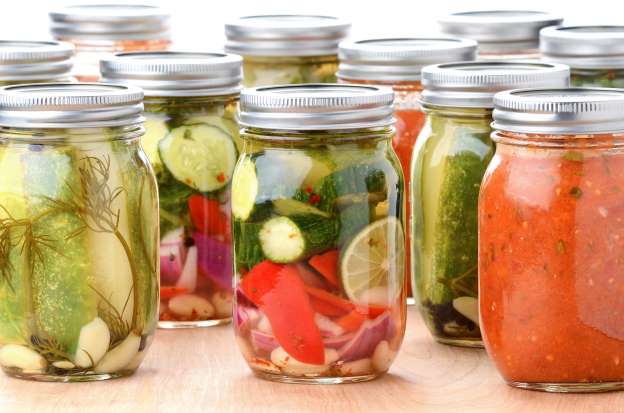Pickled Versus Fermented Foods: Which Is Better for Your Gut?

Have you ever wondered what the difference is between pickled and fermented foods? Lately, there’s been a lot of confusion surrounding the difference between pickled and fermented foods. How are these foods prepared? Are there any health benefits? Here we set out to explain what separates those kosher dill pickles we eat with our sandwiches from the kimchee we eat alongside our ramen noodles.
What Exactly is Pickling?
Pickling is technically a method of “cooking” or breaking down food, as it is a process that can both preserve food and/or make otherwise “raw” food edible and ready for immediate consumption. This breaking down can occur two different ways: (1) pickles can be fermented, or (2) a quick vinegar or lemon juice massage will also yield the sour, pickled taste you crave.
But wait- what about fermenting? Isn’t that the same thing?
So here’s the story. All fermented foods are pickled, but not all pickled foods are fermented. Fermented food sits out for a substantial period of time, thereby introducing ambient bacteria that will naturally ferment the food that is undergoing the pickling process. So, the way to make a homemade pickled food into fermented food is to let it sit out for at least 10 days or longer with all the food fully submerged in the liquid brine. Specifically, if you wanted to lacto-ferment a plant food,...In the process of lacto-fermentation, bacteria convert sugar in the food product to lactic acid, which is a preservative. Simply put: Lactobacillus + sugar + salt + time – air = lactic acid fermentation!
Real Life Examples
Next time you’re in the grocery store, you’ll be able to note these key differences! Dill pickles, for instance, are pickled cucumbers that have been “cooked” in a vinegar brine with garlic, dill etc. Store-bought pickles are usually NOT fermented. Sauerkraut, which is technically pickled cabbage, is pickled via fermentation. And that famous miso we all know and enjoy is naturally fermented soybean that is prepared using salt and fungus.
So what does this have to do with my health?
Due to the bacterial fermentation process, food that is naturally fermented is also a rich source of probiotics (health-supportive bacteria that aid in digestion). These bacteria naturally enhance the gut microflora. Fermented foods also increase the bioavailability of a selection of vitamins and minerals, including some B vitamins, zinc and magnesium. Additionally, fermented foods enhance amino acid status in protein-rich foods. In this way, fermentation can help to bring an incomplete protein closer to “completion.” The fermentation process enhances and creates anti-inflammatory phytochemicals (in plant-based foods), which possess a considerable amount of antioxidant power. Fermented foods, therefore, play an active role in gut health, bone health, and the immune system!
Note: PLEASE consult with your doctor before making any changes to your diet or medications. The material on this site is provided for educational purposes only, and is not to be used for medical advice, diagnosis or treatment.
























